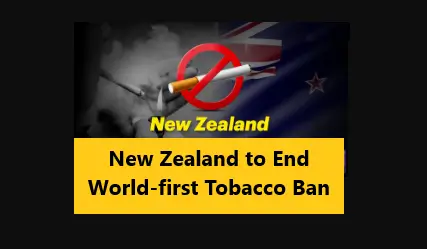New Zealand to End World-first Tobacco Ban.
New Zealand Scraps World-First Tobacco Ban: Evaluating the Implications
New Zealand is on the verge of repealing a groundbreaking law that would have prohibited the sale of tobacco products to anyone born after January 1st, 2009.
Read More: Tobacco Growers’ Share Concerns Over WHO Findings
This unprecedented legislation, set to take effect in July 2024, has ignited heated debate within the public health community and garnered international attention.
However, on the eve of its implementation, the newly elected coalition government has opted to scrap the law entirely.
Unprecedented Legislation and its Goals:
The Smokefree 2025 Action Plan, launched in 2011, outlined New Zealand’s ambitious goal of becoming smoke-free by 2025. This bold initiative culminated in the passage of the “Smokefree Environments Amendment Act 2022” in December 2022. This legislation aimed to achieve its goal through several key measures:
- Banning the sale of tobacco products to anyone born after January 1st, 2009, effectively making them unavailable to future generations.
- Significantly reducing the nicotine content in smoked tobacco products, making them less addictive.
- Drastically decreasing the number of tobacco retailers by over 90%, aiming to limit accessibility.
Motivation for Repeal:
Despite the potential public health benefits, the newly elected government has opted to repeal the law citing several concerns:
- Effectiveness: Doubts were raised about the enforceability of the ban, particularly regarding the potential for a black market to emerge.
- Social Impact: Concerns arose about the disproportionate impact the ban could have on low-income communities and marginalized groups with higher smoking rates.
- Individual Liberties: Some argued the ban infringed on individual liberties and the right to personal choice.
Alternative Approaches:
The government has pledged its commitment to reducing smoking rates and pursuing alternative strategies, including:
- Increased tobacco taxes to deter consumption.
- Enhanced public education campaigns to raise awareness about the health risks of smoking.
- Expanded support for smoking cessation programs to help individuals quit.
- Regulation of vaping products to prevent their use as a gateway to smoking, particularly among young people.
Expected Impact and Ongoing Debate:
The decision to repeal the tobacco ban has sparked widespread controversy. Public health experts and anti-smoking advocates have expressed grave concerns about the potential consequences, arguing that it undermines efforts to achieve a smoke-free future and could lead to increased smoking rates and preventable deaths.
Opponents of the repeal also raise concerns about the disparate impact it might have on Maori and Pasifika populations, which already face higher smoking rates due to historical and social factors.
The repeal of this landmark legislation sends a mixed message about New Zealand’s commitment to public health and tobacco control. While alternative approaches are planned, their effectiveness in achieving the ambitious goal of a smoke-free nation remains to be seen. This decision will undoubtedly continue to be debated and analyzed for years to come, with its repercussions impacting not only New Zealand but also potentially influencing global tobacco control strategies.
Note: The information above might not be accepted 100%. Please verify from your own sources. We will not be responsible for any kind of loss due to our content.
For more news, please visit Munafa Marketing.




